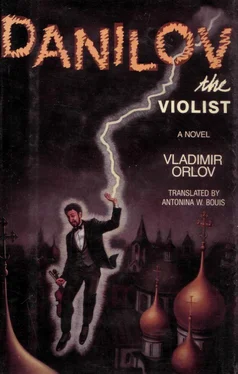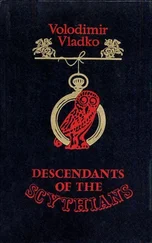"But what if Chekhonin is behaving that way," Danilov said, "in search of harmony? At least for himself."
Zemsky merely waved his hand.
"No," he said, "the world is anything you want to call it -- but not harmony. That means that traditional music lies. I, Nikolai Borisovich Zemsky, respect the creators of the past; in some of them, say Beethoven, I see a nature similar to my own, and I pity them for having taken a false path. Let their works remain, let them be performed by pedants in museums two hundred years from now. That changes nothing... But real music, in order to correspond to the world, should not extract only the sweet sounds from Nature, it should also be honest and treat all sounds, be they horrible or even blasphemous, and torment people's souls with the truth of life. Has our age come up with a new music? No. It's true that the music of our age is more nervous and angry than the compositions of the past. But as a whole -- with jazz improvisations and atonal directions and the discoveries of pop artists and so on and so on -- it is still the same traditional music."
Here Nikolai Borisovich stopped and grew silent.
"Therefore," Danilov said, "your direction, silencism, aspires to a certain universality? And you have created a system of universal sounds?"
"I haven't created anything," grumbled Zemsky. "All the sounds necessary for true music are in each of us. And they are as rich and true in comparison to external sounds as are our thoughts and feeling when compared to our words and gestures.
"Music should be written that will sound only inside each listener. This music will never grow obsolete and at the moment of its performance will correspond exactly to the level of people's conception of the world and the level of the development of music."
Naturally, Nikolai Borisovich had in mind only those listeners who were capable of comprehending his compositions. These compositions did not need to be written down in musical notation. Musical notation would grow obsolete, the way cuneiform writing had. The compositions would need only precise verbal designations. And of course, later, even the words could be replaced by something more perfect.
To make the approach to his music easier, Nikolai Borisovich had written many works in traditional musical forms. And he used familiar instruments. Later, when people had mastered Zemsky's music, they would understand his more complex works, written without concessions to old tastes.
"I would have explained all that to you right away," Nikolai Borisovich said. "Now I'll play another piece for you. It's also for the violin. That's also a concession... But I have to do that for you so you can feel my music... It's a more complex work. It's called 'Bare Ice in April on Commune Square.' It has three parts: 'Anticyclone,' 'Ice on Asphalt,' and 'The Breaking of the Trolleybus Windows.' "
Judging by the bow's nervous motions, this composition once again reflected the tragic clash of elements and destinies. Danilov watched Zemsky's playing intensely, trying to hear something. Suddenly it seemed to Danilov that he really was hearing music or at least the howling of the night wind and the rustle of newspaper scraps carried by the wind over frozen puddles. When Nikolai Borisovich reached the third part, Danilov shut his eyes and clearly pictured a milk tank truck right in front of the park entrance crashing into the side of trolleybus 13 -- and the windows breaking.
"I heard something," Danilov told Zemsky, who was putting his violin away in its case. "Something sounded in me."
"It's not necessary for it to sound," Zemsky said. "It has to arise..."
"No, really," Danilov said, as if convincing himself. "There was something, there was!"
Now it even seemed to him that he heard not only the howling wind and rustling papers, the breaking glass and squealing brakes, but also something special, musical, that had touched his soul. He clearly felt sympathy for the driver of the smashed-up trolleybus. But he did not dare tell this to Nikolai Borisovich, who perhaps had intended eliciting a completely different response to his work.
"It's fine with instrumental music," Danilov said. "But what about ballets?"
"The principle's the same. You must convey the idea to the audience. For the less talented creatively there will have to be a libretto, a brief one, like program notes. Later, I think, the need even for performers will fall off. Everyone will watch and listen to ballet within himself. Some will gather in theaters out of habit; others will stay at home in an armchair like this, with their eyes shut..."
"You mean Tchaikovsky," Danilov said, "could have conveyed to us the ideas of Swan Lake or Sleeping Beauty this way? Ideas that would be more profound and personal than the ones we have now."
Nikolai Borisovich must have heard the irony in Danilov's words, for he took them as an insult.
"No, Tchaikovsky couldn't have, he couldn't!" he said hotly. Then he quieted down and added weakly, as if he had lost all interest in the subject: "You, brother Danilov, are bound by the shackles of the old music. And you have no intention, for now, of breaking free. You like them. It's sad but understandable. You are young, you've started to play well, brilliantly at times, and you expect a lot for yourself from the old music. Once I was like that -- look over there on that shelf, I have prizes and diplomas. I could have gone far. But doubts gnawed at me, I expected perfection, perfection! However, perfection did not come. And then everything bored me. But I did not give up. I conquered. In silencism I will find perfection as a performer, a creator, and a thinker. Or I already have... But you play, play, make sound while you can! You're still young."
"Not so young," Danilov said sadly.
"Actually ... Misha Korenev was already defeated at your age.
"Misha used to come to you?"
"He was like a son to me."
Nikolai Borisovich stood up abruptly and began pacing the room.
"Did Korenev accept silencism?" he asked.
"Misha understood me. But silencism frightened him. Terribly ... However, his final act tells me that he accepted silencism."
"Does it?"
"Yes," Zemsky said. "You learned the ABCs of silencism today... But Misha went off into higher silence. He leapt there ... or ascended..."
"Then for you the highest silence is the disappearance of the personality, death? Is that it?"
"No," Zemsky countered hotly. "Not for me! I'm a creator! For me music is the continuation of life. Even if life consists of nothing but sorrow and sin. But for weak personalities, Misha's leap into silence is serenity.
"In order to justify his existence, Misha was determined to create practically a bonfire in music -- the old music, naturally. Or a fireworks display. But in general, I'll tell you, he wasn't particularly gifted..."
"I know," Danilov said with a nod.
"He wasn't, alas ... but he'd fall into a frenzy, thinking that he could conquer music, and then he'd collapse into a depression... saying that he should go off to become a truck driver or something. I watched him and I understood that he would go off, but not to become a truck driver..."
"And you didn't try to stop him?"
"No."
"But he was like a son to you..."
"Everyone has his destiny... No, I didn't console him, on the contrary. The same thing had happened to me, but I didn't give up. It's a question of either -- or here. There is no middle ground. He did not survive. And that means that he couldn't have survived..."
"You tempted him... You pushed him toward the abyss..."
"Maybe it was to the abyss. Maybe it's more accurate to say toward the window. Yes, I did tempt him. Yes, I did push him. And I don't regret it... But I didn't push him to the abyss, I pushed him to a choice and a decision... He chose silence... He couldn't have chosen anything else..."
Читать дальше












